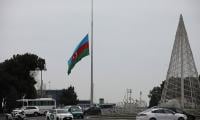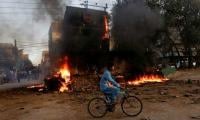BHOPAL, India: Just after midnight as poisonous plumes of smoke wafted through the Indian city of Bhopal four decades ago, Gas Devi was born, gasping for every breath.
Her feeble cries were drowned out by the screams of men, women and children as they ran to escape the cloud of highly toxic gas leaking from the Union Carbide factory on the night of December 2, 1984.
Some 3,500 people were killed in the immediate aftermath, and up to 25,000 are estimated to have died overall in the world´s deadliest industrial disaster. Forty years later, the horror continues to blight the lives of those like Devi -- as well as countless others born with deformities since that fateful night.
Devi, a daily wage labourer, has constant pain in her chest, one of her lungs is not developed fully and she keeps falling sick. “My life is a living hell,” Devi told AFP, speaking at her shanty in Bhopal, the capital of the central state of Madhya Pradesh.
Even if she wanted, she cannot forgot the night she was born. “My parents named me Gas,” she said, her eyes welling up. “I believe this name is a curse. I wish I had died that night”. Twenty-seven tonnes of methyl isocyanate (MIC), used in the production of pesticides, swept through the city of over two million people after one of the tanks storing the deadly chemical shattered its concrete casing.
As the white cloud of MIC shrouded areas close to the factory, people started collapsing in the streets. “People were frothing from their mouths. Some had defecated, some were choking in their own vomit,” said Soni.
A handkerchief tied over his nose, Soni used his pushcart to carry his wailing neighbours, many of them infants, to hospital. Rashida Bee, co-founder of the Chingari Trust charity that offers free treatment to children of gas-affected families, believes those who died were fortunate.
“At least their misery ended,” she said. “The unfortunate are those who survived”. Her trust has seen more than 150 children being admitted this year alone with cerebral palsy, hearing and speech impairments and other disabilities.
She blames the disorders on the accident and the contamination of the groundwater. Testing of groundwater near the site in the past revealed cancer- and birth defect-causing chemicals 50 times higher than what is accepted as safe by the US Environmental Protection Agency.
“This tragedy is showing no signs of relenting,” said Rashida, 68, who has lost several members of her family to cancer since the accident. “The soil and water here are contaminated -- that is why kids are still being born with deformities.” Union Carbide, which was acquired by the Michigan-based Dow Chemical Company in 2001, routinely dumped chemical waste years before the disaster, campaigners say.
Large evaporation ponds outside the factory were filled with thousands of litres of liquid waste. Toxins penetrated the soil and the water supplying several neighbourhoods. Dow Chemical did not respond to AFP´s request for comment.
Tasleem Bano, 48, is convinced of a link between the plant and congenital illnesses. Her son Mohammed Salman´s limbs were splayed when he was born. “His twin brother died in the womb. Salman survived but he could not speak a word till he was six years old,” she said, showing her son´s braces that help him to stand.
Representational image of empty streets and closed shops in central Maputo ahead of a ruling on disputed elections on...
The flag of Serb Republic on a building in East Sarajevo, Bosnia and Herzegovina, January 9, 2023. —...
US President Joe Biden speaks as he visits the Department of Labor for an event honoring the nation's labor history...
Japanese foreign minister Takeshi Iwaya pictured in a Christmas event in Beijing. — AFP/FileBEIJING: Japanese...
A woman shovels snow on the main street during snowstorm in Sarajevo, Bosnia and Herzegovina, December 24, 2024.—...
A firefighter works at the site of residential buildings hit by a Russian drone strike in Kharkiv, Ukraine on December...







